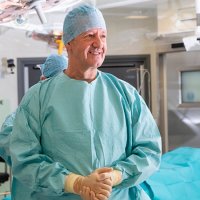Abdominal pain during the COVID-19 pandemic
Escrito por:Mr Alan Woodward, a consultant general surgeon, explains which symptoms indicate that you should contact your GP immediately. He also explains whether you’re likely to be offered temporary relief from symptoms at home or hospital admission to see a specialist.
Hospital admissions for abdominal pain have declined
As we approach the peak of the coronavirus infection in the UK, it has become clear that admissions to hospital for other conditions, such as abdominal pain, have declined. Whilst it is imperative to avoid travel at this critical time, it is also necessary that we seek appropriate help for abdominal pain if it happens. This is to avoid identifying surgical conditions at a later stage. In normal circumstances, the majority of general surgical admissions to hospital are due to the following:
- gallstones
- appendicitis
- diverticulitis
- bowel dysfunction including constipation
- nonspecific abdominal pain
Whilst this list is not exhaustive, it accounts for 80% of the conditions which are normally seen on a daily basis by the surgical team.
How do these conditions present?
The site of the abdominal pain often gives us a clue about from which organ the pain is coming from.
- Gallstones usually start with pain in the upper abdomen, and this pain may travel through to the back or to the right side under the ribs.
- Appendicitis nearly always consists of pain in the right side of the lower abdomen, sometimes starting initially around the belly button.
- Diverticulitis is an inflammation of the colon and is sometimes referred to as left-sided appendicitis since the pain is typically on the left side of the lower abdomen.
- Constipation, when severe, can cause significant abdominal pain and usually consists of a cramping pain across the whole of the lower abdomen.
- Non-specific abdominal pain is so-called because there is usually no underlying serious problem and because it can also mimic the other causes of abdominal pain.
When do I need to seek help?
Contact your GP or call 111 in the following scenarios:
- The abdominal pain persists for more than a few hours and gradually or suddenly increases in severity
- If pain is associated with tenderness to touch
- If the pain is associated with an elevated temperature
- If there is abdominal distension (swelling of the abdomen, not necessarily the stomach)
- If there are associated symptoms including burning when passing urine, your body shaking uncontrollably, heavy rectal bleeding, persistent vomiting or uncontrollable diarrhoea.
How will I be treated if I go to hospital?
During this pandemic, every effort is being made to avoid hospital admission and so GPs will only refer you if it’s deemed absolutely necessary. It’s highly likely that you would then be seen by a consultant surgeon whose main aim is to decide if you need surgery. Most patients are not being admitted for observation currently. Therefore, you should expect that you will be sent home with reassurance painkillers, possibly laxatives or even antibiotics.
CT scanning is being widely used to help diagnosis and to determine whether patients require surgery or outpatient observation. If you are diagnosed with uncomplicated appendicitis, you may be treated with antibiotics and early regular review in outpatients, rather than surgery.
The majority of patients with gallstones can be managed with painkillers and those with infected gallstones will require antibiotics. Inflammation of the pancreas due to gallstones (pancreatitis) may require hospitalisation as in a few cases this can be life-threatening. This significant move away from operative treatment is designed to minimise your chances of contracting COVID-19 whilst on hospital premises.
How can these abdominal conditions be avoided?
Many of these conditions are influenced by lifestyle. Therefore, it’s imperative that whilst we are at home for prolonged periods, we maintain our hydration with at least 8 glasses of water per day. It is also essential to eat a healthy diet including 8 portions of fruit and vegetables per day and to avoid excessive intakes of saturated fat and alcohol. If possible, it is sensible to be active for an hour a day and this can be as simple as going for a walk.
In spite of living a healthy lifestyle, surgical problems may still develop and it is important that you seek a medical opinion. Your local hospital is equipped to deal with emergency surgical issues as well as coping with COVID-19 admissions.
Look after yourselves.
Stay safe.
To get in touch with Mr Woodward, visit his profile and select one of the contact options.



